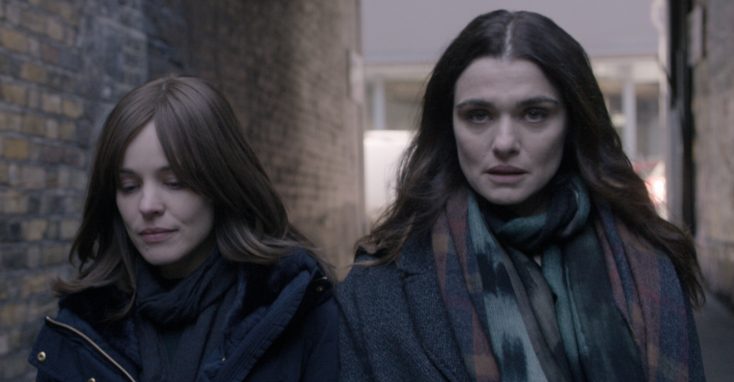
(l-r) Rachel Weisz as Ronit Krushka and Rachel McAdams as Esti Kuperman in DISOBEDIENCE. ©Bleecker Street.
By ANGELA DAWSON
Front Row Features
HOLLYWOOD—Oscar winner Rachel Weisz (“The Constant Gardener”) has played a number of leading ladies to marquee male stars. She was Brendan Fraser’s love interest in “The Mummy” movies, Jeremy Renner’s co-conspirator and love interest in “The Bourne Legacy,” Tom Hiddleston’s paramour in “Deep Blue Sea” and, of course, Ralph Fiennes’ wife in “The Constant Gardener,” for which she earned an Academy Award.
A few years ago, the distinguished British actress decided she wanted to stretch, artistically.
“I wanted to start finding material to be in and I wanted to find a good role for a woman,” the brunette star says in an interview during a stopover in L.A. “I thought it would be great to have two good female roles, and have women in relation to one another, rather than a woman in relation to a man, which is what I’m used to doing, and what I would say most films are about.”
Weisz, who is married to actor Daniel Craig and reportedly is pregnant with their first child together, started reading lesbian literature for material. She discovered Naomi Alderman’s “Disobedience,” a 2006 novel in which two women of the Jewish Orthodox faith rekindle a forbidden affair years after one of them fled the community.
“This one struck me because it’s contemporary,” the actress says. “It’s not set in the ‘50s, where this kind of sexuality was taboo, but in the present day. It’s set three stops on the Tube from where I grew up in London, so it’s near geographically but far (ideologically). I don’t know anyone from this community. It’s a very, very private community.”
Published in 2006, Alderman’s debut novel earned several book awards, including the Sunday Times Young Writer of the Year award. Chilean writer-director Sebastian Lelio (2018’s Academy Award winner for “A Fantastic Woman”) and Rebecca Lenkiewicz adapted the book for the film. It tells the story of a woman named Ronit (played by Weisz), a New York photographer who returns to her childhood London neighborhood after learning of her estranged father’s death. She had abandoned her widower father, a rabbi, years earlier when he refused to accept her forbidden sexual relationship with a female friend.
Ronit’s return is generally greeted with coolness from the community, though they allow her to participate in the mourning rituals following the revered rabbi’s death. Her former lover, Esti (played by “The Notebook’s” Rachel McAdams) has married the rabbi’s protégé, Dovid (Alessandro Nivola), who is in line to take over the senior post at the synagogue.
Ronit and Esti try unsuccessfully to fight their attraction but eventually succumb to their desires in an erotic tryst at a hotel outside of the religious community. Ronit urges Esti to follow her heart and leave her husband. As the week of tumult and mourning come to a close, Ronit ultimately finds absolution when she learns of her father’s dying words.
In addition to starring in the film, Weisz produced “Disobedience” in conjunction with noted TV and film producer Frida Torresblanco (“Rudo y Cursi”).
Q: What was it about Naomi Alderman’s story that appealed to you?
Weisz: It’s not an autobiography, but Naomi grew up in that community and left it and then went to New York, so she’s a little bit like Ronit. I just thought it was kind of an extraordinary story because it’s contemporary. It could have been set in the Amish community or the Mennonite community. It’s like “Witness,” which was about a different kind of sexuality, but also about forbidden love.
Q: Did you initially connect with the Ronit character? Or did you want to play Esti?
Weisz: I feel like I would have liked to have played Esti too, but Sebastian (Lelio) was like, “No, no, no, you’re Ronit.” I thought they were both wonderful parts.
Q: What do you think Sebastian Lelio brought to this project as a filmmaker? Obviously, he’s worked on female-centric films before.
Weisz: He read the book and he was the first director I went to. I just knew that he was passionate, unsentimental, empathic and glorious.
He immediately said, “Yes.” He really connected with the universality of the story, which transcended Judaism and its Britishness. I didn’t know what he was going to bring to it. I just knew that, having seen (his film) “Gloria” and “A Fantastic Woman,” that he puts people who are normally in the margins of storytelling front and center. So, I knew this would be true of these two women in “Disobedience.” I just trusted him to go on this voyage and see what he would do. He’s juggling three characters, including Alessandro’s character, whose kind of stuck in the middle. You don’t normally see stories about rabbis dealing with their marriage and their sexuality. It’s just very unusual.
Q: Ronit deals with the feelings she has for Esti but shoulders guilt for having left her father on bad terms. What did you make of that aspect of it—the black sheep coming home and feeling guilty about unresolved issues?
Weisz: It’s a father/daughter story where you don’t get to see them together, and she is never going to get a chance to say goodbye to her father, you think, but then she does in the last frame. She says goodbye to his grave, which is complex. A lot of gay men have actually said to me that they identified with Ronit, because they felt like their greatest fear was being rejected by their father because of their sexuality, which is what happened to her. There are lots of stories about fathers and sons, classical stories, but there are far less about father and daughters.
Q: The sexuality is very important within the film. Is it any more of a challenge doing a love scene with a female actress verses an actor?
Weisz: In a way but it was because the scene was much more important than it’s ever been in any film I’ve made before. Sex scenes can often feel gratuitous and you think, “Could the story do without this? Yeah, it probably could.” In this case, absolutely not. It was the center, the heart of the movie, because everything was leading up to this explosion of freedom, particularly from Esti. It was essential storytelling. It was very emotional. It was very vulnerable. I’ve never done a sex scene that was that emotional. It’s very rare. It wasn’t just about sex, passion or erotica, although it was those things too. It was about tenderness, emotion and release and it had a huge, symbolic meaning in the film.
Q: Did you and Rachel McAdams have a chance to hang out together prior to filming?
Weisz: No, we didn’t, and we didn’t really want to. We never had that conversation but I could tell that we both work the same way. We met before we filmed and talked through things with Sebastian, but we didn’t go off on our own and kind of do some method acting. I don’t think either of us work in that way. Chemistry is something that either happens or it doesn’t. I like to think it did.
Q: This film received positive reviews following its premiere at the Tribeca Film Festival. What kind of response have you received personally from the gay community?
Weisz: I haven’t spoken to that many people about it before today. I’ve mainly spoken to LGBT and lesbian (media) outlets and they’ve mostly been very—I don’t want to say grateful—but happy and validated at being represented. They felt, for instance, the sex scene was really good and right and moving. The gay women I’ve spoken to thus far have all really loved it.
Q: Have you had any comments from the Orthodox community?
Weisz: No. My sense is, I don’t know how many people from the community will see it, because they don’t really see films, let alone films with sex in them. Naomi Alderman, who I mentioned grew up in that community, took her family, who are still Orthodox Jews, to see it. I believe they really liked it, so they’re the only people I know of. (The film is) respectful of their faith. It’s not judgmental. It sees great beauty, spirituality, nourishment in God and in community. It’s just, you can’t be gay. So, what do you do? If you’re Esti, what do you do? It’s a conundrum.
Q: The film also delves into the Orthodox faith’s grieving ritual.
Weisz: Yeah. It’s like the cousin of an Irish wake, and not dissimilar. People bring food and the wake is seven days. That’s the thing about religions. They’re all so similar when you start to break them down.
Q: What else have you been looking at to produce? Is there a lot of material available that’s just not being produced?
Weisz: Sure. There’s a lot of stories for men and women of every age. You just have to want to put them in a film. I’ve got about six different projects in development, at various stages. This is the first one that’s made it to the screen. I’d also like just to be offered jobs and do jobs that I’m given, but I’m really enjoying working with writers and finding interesting stories to tell.
Q: What’s next for you?
Weisz: I’ve got “The Favourite” coming out. It’s not just two female leads but three. It’s three very complicated, unusual, problematic women in the lead roles, all jostling for power and for attention of both each other and probably the audience. I’ve also got another movie called “The Mercy” with Colin Firth.
Q: How do you like being a producer? It’s not something you set out to do in your career. It just evolved, right?
Weisz: Yeah, and I love it. I’ve done enough films now that I kind of know what my taste is. It’s a really interesting exploration. I really am enjoying it.



